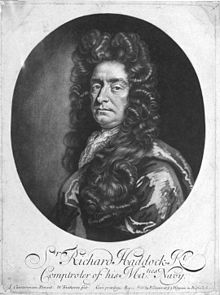Richard Haddock
| Richard Haddock | |
|---|---|
 |
|
| Born | 1629 Leigh-on-Sea |
| Died | 26 January 1714 London |
| Allegiance |
|
| Service/branch |
|
| Years of service | – 1714 |
| Rank | Admiral |
| Commands held |
HMS Dragon HMS Portland HMS Royal James HMS Lion HMS Royal Charles HMS Duke |
| Battles/wars |
Holmes's Bonfire Battle of Solebay Battle of Schooneveld Battle of Texel |
| Awards | Knighthood |
| Relations | Nicholas Haddock (son) |
Sir Richard Haddock (c.1629 – 26 January 1715 Old Style) was an officer of the Royal Navy. He served during the Anglo-Dutch Wars, eventually rising to the rank of Admiral in August 1690. In Herge's Adventures of Tintin, Richard Haddock was one of the inspirations for Captain Haddock's 17th century ancestor, Sir Francis Haddock.
Haddock was born into a distinguished navy family. His grandfather, also Richard Haddock, had been rewarded by the government in 1652, having held commands under both Charles I and subsequently the Parliamentary regime; he commanded the Victory in 1642, the Antelope in 1643-44, the John in 1644 and the Unicorn in 1648. In 1652 he served as Vice-Admiral commanding the Vanguard. His father, William Haddock, also commanded trading vessels, and was appointed on 14 March 1651 to command the America, a ship hired by the Commonwealth of England Navy. He served in the First Anglo–Dutch War and saw action in 1653. For his services he was awarded a gold medal. William initially lived in Deptford, but subsequently moved to Kent. He had a number of children, several of whom followed him into the navy, including his son Richard.
Richard Haddock had command of HMS Dragon from 1656 to 1660, but was then unemployed until 1666 when he took command of the 50-gun HMS Portland on 14 June 1666. During this period, he was given command of one of the companies involved in the attacks on Ulie and Schelling in August 1666. He relinquished command of the Portland on 9 November 1667.
...
Wikipedia
